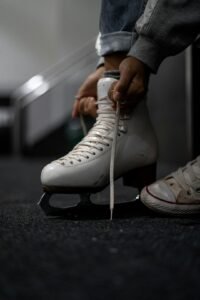Comprehensive Guide of Quidditch
Overview
Quidditch is a dynamic and fast-paced sport inspired by the fictional game from J.K. Rowling’s Harry Potter series. Played on a rectangular field, Quidditch combines elements of rugby, dodgeball, and tag, making it a unique and engaging activity for players and spectators alike. The game features four balls: the Quaffle, two Bludgers, and the Golden Snitch, with players taking on various roles such as Chasers, Beaters, Keepers, and Seekers. Quidditch promotes teamwork, strategy, and physical fitness, while also fostering a sense of community among players. The sport has evolved into a real-life competitive activity, with leagues and tournaments held worldwide, attracting a diverse range of participants.
History
The origins of Quidditch as a real sport can be traced back to 2005 when a group of college students at Middlebury College in Vermont adapted the fictional game into a playable format. The first official Quidditch match was held in 2005, and the sport quickly gained popularity on college campuses across the United States. In 2007, the International Quidditch Association (IQA) was established to govern the sport and organize competitions. Since then, Quidditch has grown exponentially, with national and international tournaments, including the Quidditch World Cup, showcasing the sport’s global appeal. The rules and structure of the game have continued to evolve, with various leagues implementing their own regulations to enhance gameplay and inclusivity.
Popularity and Demographics
Quidditch has become a popular hobby and sport among a diverse demographic, particularly among young adults and college students. The inclusive nature of the game, which allows for mixed-gender teams, has contributed to its appeal, fostering a welcoming environment for players of all backgrounds. According to the IQA, there are over 400 registered teams worldwide, with significant participation in countries such as the United States, the United Kingdom, Canada, and Australia. The sport has also gained traction in high schools and community organizations, promoting physical activity and teamwork among youth. Social media platforms and fan communities have further fueled interest in Quidditch, allowing players to share experiences, strategies, and achievements, thus enhancing the sport’s visibility and growth.
Sponsored Hobbyists and Vendors
Become a Sponsor!
Affiliate Disclaimer: Throughout some sections below, Hobby Spotlight may suggest some tools, equipment or material using affiliate links. By purchasing any of those items, Hobby Spotlight may earn a small commission. This helps fund our website, content and services without directly charging our users.
Getting Started
Quidditch Equipment:
Beginner
- Quidditch Broom: A lightweight broom designed for beginners to practice flying.
- Quidditch Ball Set: Includes a Quaffle, Bludgers, and a Snitch for practice games.
- Quidditch Uniform: Basic uniform for players, including jersey and shorts.
- Goal Hoops: Set of three hoops for scoring in Quidditch matches.
- Protective Gear: Basic protective gear including knee pads and elbow pads.
Intermediate
- Advanced Quidditch Broom: A more advanced broom for experienced players with better aerodynamics.
- Quidditch Training Manual: A guide with advanced techniques and strategies for playing Quidditch.
- Team Jerseys: Customizable jerseys for team identification during matches.
- Quidditch Referee Kit: Includes a whistle, cards, and a rulebook for officiating games.
- Quidditch Practice Equipment: Includes cones and markers for setting up practice drills.
Basic Requirements and Initial Setup:
- Equipment: Essential gear includes a broomstick, a Quaffle, two Bludgers, and a Golden Snitch. Each player should have a broom that is comfortable and suitable for play.
- Field Space: A large, open area is necessary to accommodate the three goal hoops at each end and allow for safe gameplay. A standard Quidditch pitch is 100 yards long and 50 yards wide.
- Team Composition: A Quidditch team consists of seven players: three Chasers, two Beaters, one Keeper, and one Seeker. Understanding each role is crucial for effective gameplay.
Fundamental Skills to Learn:
- Ball Handling: Mastering the ability to throw, catch, and pass the Quaffle is essential for Chasers.
- Defensive Strategies: Beaters must learn to protect their teammates from Bludgers while also targeting the opposing team.
- Goalkeeping Techniques: Keepers need to develop skills to block Quaffles from entering the goal hoops.
- Speed and Agility: Players must be quick on their brooms, able to maneuver effectively during play.
- Team Communication: Effective communication among team members is vital for coordinating plays and strategies.
Sub-Hobby/Common Activities:
- Practice Drills: Regular training sessions focusing on passing, shooting, and defensive maneuvers to improve team performance.
- Quidditch Tournaments: Participating in local or national competitions to test skills against other teams.
- Strategy Meetings: Discussing game tactics and strategies to enhance team coordination and effectiveness.
- Fitness Training: Engaging in physical conditioning to improve endurance, strength, and agility for better performance on the pitch.
- Community Events: Organizing or participating in Quidditch-related events to promote the sport and engage with fans.
Terminology:
- Chaser: A player who scores goals by throwing the Quaffle through the opponent’s hoops.
- Beater: A player responsible for using bats to hit Bludgers away from teammates and towards opponents.
- Keeper: The player who guards the goal hoops to prevent the opposing team from scoring.
- Seeker: The player tasked with catching the Golden Snitch to end the game and earn additional points.
- Quaffle: The ball used by Chasers to score goals, worth 10 points each.
- Bludger: A ball that flies around the pitch, trying to knock players off their brooms; Beaters defend against them.
- Golden Snitch: A small, winged ball that is worth 150 points when caught by the Seeker.
- Pitch: The playing field for Quidditch, typically oval-shaped with three goal hoops at each end.
- Score: The act of getting the Quaffle through the opponent’s hoops, contributing to the team’s total points.
- Foul: An illegal action during the game that can result in penalties or free throws for the opposing team.
Advanced Topics and Specializations
Advanced Quidditch Equipment:
- Professional Quidditch Broom: A high-performance broom designed for speed and agility, featuring advanced aerodynamics for competitive play.
- Quidditch Goal Hoops: Regulation-sized goal hoops made from durable materials, designed for official Quidditch matches.
- Quidditch Bludgers: High-quality, weighted balls designed for durability and optimal performance in competitive Quidditch games.
- Quidditch Uniform Set: Professional-grade uniforms made from breathable, moisture-wicking fabric, designed for comfort and style during matches.
- Quidditch Snitch: A high-quality, durable Snitch designed for competitive play, featuring a lightweight design for easy handling.
Advanced Projects and Achievements:
- Quidditch World Cup Participation: Competing in international tournaments, showcasing skills and teamwork on a global stage.
- Team Formation and Management: Establishing and leading a local quidditch team, focusing on recruitment, training, and strategy development.
- Event Organization: Planning and executing quidditch matches and tournaments, including logistics, marketing, and community engagement.
Advanced Techniques and Methods:
- Strategic Playmaking: Developing advanced game strategies that enhance team performance and adaptability during matches.
- Fitness and Conditioning: Implementing specialized training regimens to improve endurance, agility, and strength for quidditch players.
- Equipment Customization: Modifying brooms and protective gear to enhance performance and comfort during gameplay.
Specializations and Niche Areas:
- Mixed-Gender Teams: Promoting inclusivity and diversity by forming teams that encourage participation from all genders.
- Youth Quidditch Programs: Developing training programs and leagues for younger players to foster interest and skill development.
- Quidditch Coaching: Specializing in coaching techniques to train new players and improve existing team members’ skills.
- Quidditch Refereeing: Focusing on the rules and officiating of quidditch matches, ensuring fair play and adherence to regulations.
- Quidditch Community Building: Engaging with local and online communities to promote the sport and share resources.
Future Trends and Innovations:
- Increased integration of technology in training and gameplay, such as performance tracking apps.
- Growth of quidditch leagues and tournaments at the collegiate and professional levels.
- Enhanced focus on sustainability in equipment and event management.
- Expansion of quidditch into new regions and countries, promoting global participation.
- Development of virtual reality training tools to simulate game scenarios for practice.
Technology Integrations:
- Performance Analytics Software: Utilizing data analysis tools to assess player performance and team dynamics.
- Social Media Engagement: Leveraging platforms to promote events, share highlights, and connect with fans.
- Online Training Resources: Accessing video tutorials and coaching tips through dedicated quidditch websites and apps.
- Wearable Technology: Implementing fitness trackers to monitor player health and performance metrics during training and matches.
- Live Streaming of Matches: Broadcasting games online to reach wider audiences and enhance fan engagement.
Further Learning and Resources
Books:
- Quidditch Through the Ages by Kennilworthy Whisp: An essential read for new fans, this book provides a comprehensive overview of the history and rules of Quidditch, making it accessible for beginners.
- The Quidditch Pitch: A Beginner’s Guide to Quidditch by Various Authors: This guide introduces the basic rules, positions, and strategies of Quidditch, perfect for anyone looking to get started in the sport.
Websites:
- International Quidditch Association, https://www.iqaquidditch.com – The official governing body for quidditch worldwide, providing resources, news, and event information.
- Quidditch UK, https://www.quidditchuk.org – A comprehensive resource for quidditch in the UK, including league information, team listings, and events.
- US Quidditch, https://www.usquidditch.org – The national governing body for quidditch in the United States, offering resources for players, coaches, and fans.
- Quidditch Canada, https://www.quidditchcanada.com – Provides information on quidditch teams, tournaments, and development programs in Canada.
- Quidditch World Cup, https://www.iqaquidditch.com/worldcup – Details about the international quidditch tournament, including past results and upcoming events.
Courses:
- Quidditch Coaching Course, https://www.iqaquidditch.com/coaching – A comprehensive course for aspiring quidditch coaches, covering strategies, rules, and team management.
- Quidditch Referee Training, https://www.usquidditch.org/referee-training – Training program for referees, focusing on the rules of the game and officiating techniques.
- Quidditch Skills Development Workshop, https://www.quidditchuk.org/workshops – Workshops aimed at improving individual skills for players of all levels.
- Beginner Quidditch Camp, https://www.usquidditch.org/beginner-camp – A camp designed for newcomers to learn the basics of quidditch, including gameplay and teamwork.
- Advanced Quidditch Tactics Course, https://www.iqaquidditch.com/advanced-tactics – An advanced course focusing on strategic gameplay and team dynamics for experienced players.
Content Creators and Community
Content Creators:
- Quidditch UK (YouTube): This channel showcases the growth of Quidditch in the UK, featuring match highlights, player interviews, and tutorials on gameplay and strategy.
- Quidditch World Cup (Instagram): The official account for the Quidditch World Cup, sharing updates, photos, and highlights from international tournaments.
- Quidditch on Twitch (Twitch): Live streaming of Quidditch matches, commentary, and community engagement, providing fans with real-time action and interaction.
Online Forums and Social Media Groups:
- Reddit – /r/Quidditch: A community for fans to discuss rules, share experiences, and connect with other players.
- Facebook Quidditch Groups: Various groups where players and fans share tips, event information, and community support.
- Discord Quidditch Communities: Interactive platforms for live discussions, strategy sharing, and organizing local games.
- Instagram Hashtags (#quidditch, #mugglequidditch): Follow trending posts, player highlights, and event updates from the Quidditch community.
- Pinterest Boards: Discover creative ideas for Quidditch-themed events, costumes, and game strategies.
Local Clubs and Organizations:
- University Quidditch Teams: Many universities have their own Quidditch teams, providing opportunities for students to join and compete.
- Local Quidditch Leagues: Various cities host leagues where teams can compete and practice regularly.
- Quidditch Clubs: Community-based clubs that welcome players of all skill levels to participate in practices and matches.
- National Governing Bodies: Organizations that oversee the rules and regulations of Quidditch, offering resources for players and teams.
- Meetup Groups: Platforms like Meetup.com host local Quidditch gatherings and practice sessions for enthusiasts.
Events, Meetups, and Conventions:
- Quidditch World Cup: An international tournament that brings together teams from around the world to compete in Quidditch.
- Local Quidditch Tournaments: Regional competitions that encourage skill development and community engagement.
- Quidditch Festivals: Events featuring matches, workshops, and opportunities to learn about the sport.
- Workshops and Clinics: Organized sessions where players can improve their skills and learn from experienced coaches.
- Quidditch Conventions: Events that combine competitions, networking, and educational sessions for players and fans alike.
Associated Hobbies
- Flying Broomsticks: A quintessential aspect of Quidditch, flying broomsticks are not only the primary mode of transportation for players but also a hobby in itself. Enthusiasts often engage in broomstick flying practices, honing their skills and techniques.
- Team Sports: Quidditch is a team sport that fosters camaraderie and teamwork. Many players enjoy participating in other team sports, enhancing their skills in collaboration, strategy, and communication.
- Costume Design: The vibrant uniforms and robes worn by Quidditch players inspire many to take up costume design as a hobby. This includes creating unique team jerseys, robes, and accessories that reflect their team’s identity.
- Fantasy Sports: Quidditch fans often enjoy engaging in fantasy sports leagues, where they can create their own teams and compete based on real-life player statistics, blending their love for the sport with strategic gameplay.
- Writing Fan Fiction: The rich lore surrounding Quidditch and its connection to the Harry Potter universe inspires many fans to write fan fiction, exploring new storylines, characters, and adventures within the Quidditch world.
- Coaching and Training: Many enthusiasts take on coaching roles, helping new players learn the rules and techniques of Quidditch. This can involve organizing training sessions, developing strategies, and fostering a love for the game.
- Event Organization: Quidditch tournaments and events require significant planning and organization. Fans often engage in organizing local matches, leagues, and community events, enhancing their project management skills.
- Community Engagement: Quidditch promotes community involvement, with many players participating in outreach programs to introduce the sport to schools and local organizations, fostering a sense of community and inclusivity.
Cost and Budgeting
Initial Investment and Ongoing Costs:
- Initial Investment: To start playing Quidditch, you will need to invest in basic equipment such as a broom, a set of balls (the Quaffle, Bludgers, and the Golden Snitch), and protective gear like knee pads and a mouthguard. The initial cost can range from $100 to $300, depending on the quality of the equipment you choose.
- Ongoing Costs: Ongoing costs may include team registration fees, travel expenses for tournaments, and maintenance or replacement of worn-out gear. Team fees can vary widely, typically ranging from $50 to $200 per season, while travel costs depend on the distance and frequency of tournaments.
Budget-Friendly Options:
- DIY Equipment: Consider making your own brooms or using alternative items for practice, such as foam balls for Bludgers, to reduce costs.
- Team Sponsorships: Look for local businesses or organizations that may sponsor your team, helping to cover costs for uniforms and equipment.
- Community Leagues: Joining a community league can often provide access to shared equipment, reducing the need for individual purchases.
Where to Buy:
- Sporting Goods Stores: Local sporting goods stores may carry some of the necessary equipment, especially protective gear and balls.
- Online Retailers: Websites like Amazon and specialized Quidditch retailers offer a variety of equipment, often at competitive prices, with the convenience of home delivery.
- Quidditch Associations: National or regional Quidditch associations often have online shops where you can purchase official gear and merchandise.
Money Making
How to Turn the Hobby into a Profession or Side Hustle:
- Quidditch Coach: With the growing popularity of Quidditch, becoming a coach for local teams or schools can be a rewarding side hustle. You can offer training sessions, develop strategies, and help players improve their skills, all while sharing your passion for the sport.
- Quidditch Event Organizer: Organizing Quidditch tournaments or leagues can be a lucrative venture. You can manage logistics, secure venues, and promote events to attract teams and spectators. This role allows you to immerse yourself in the community while generating income through entry fees and sponsorships.
- Quidditch Merchandise Sales: If you have a knack for design, consider creating and selling Quidditch-themed merchandise such as apparel, accessories, or equipment. This could include jerseys, brooms, or even custom team gear. An online store or local market presence can help you reach fellow enthusiasts.
- Quidditch Content Creator: Share your love for Quidditch through social media platforms, blogs, or YouTube channels. You can create content that includes tutorials, game highlights, player interviews, and commentary on Quidditch events. Monetization can come from sponsorships, merchandise sales, or ad revenue.
- Quidditch Referee or Official: As the sport grows, so does the need for qualified referees and officials. You can get certified and officiate games, ensuring fair play and adherence to the rules. This role not only allows you to stay involved in the sport but also provides a source of income through game fees.
Benefits and Enjoyment
Physical, Mental, and Social Benefits:
- Physical Activity: Quidditch is a highly active sport that combines elements of rugby, dodgeball, and tag. Players engage in running, jumping, and throwing, which helps improve cardiovascular fitness, strength, and agility. The fast-paced nature of the game promotes overall physical health and endurance.
- Mental Engagement: The strategic elements of Quidditch require players to think critically and make quick decisions. This mental engagement enhances cognitive skills such as problem-solving, teamwork, and communication, contributing to improved mental agility and focus.
- Social Connection: Quidditch fosters a strong sense of community and camaraderie among players. It encourages teamwork and collaboration, allowing individuals to build friendships and connections with others who share a passion for the sport. The inclusive nature of Quidditch makes it accessible to people of all backgrounds.
Success Stories and Inspirational Examples:
- US Quidditch Team: The US Quidditch Team has achieved significant success in international competitions, showcasing the growth and competitiveness of the sport. Their participation in the Quidditch World Cup has inspired many players and teams across the country to pursue the sport at a higher level.
- International Quidditch Association: The establishment of the International Quidditch Association has helped standardize the rules and promote the sport globally. Their efforts have led to the formation of leagues and tournaments in various countries, creating a vibrant international community of Quidditch enthusiasts.
- Local Teams and Leagues: Many local Quidditch teams have emerged, providing opportunities for players to engage in the sport at a community level. These teams often participate in regional tournaments, fostering a sense of belonging and encouraging players to develop their skills and passion for the game.
Ways to Enjoy and Grow in the Hobby:
- Join a Local Team: Becoming a member of a local Quidditch team is a great way to immerse yourself in the sport. You’ll have the opportunity to practice regularly, participate in games, and meet fellow enthusiasts who can help you improve your skills.
- Attend Workshops and Clinics: Look for workshops or clinics hosted by experienced players or coaches. These events can provide valuable insights into techniques, strategies, and teamwork, helping you to enhance your understanding and performance in the game.
- Participate in Tournaments: Competing in local or regional tournaments can be a thrilling way to challenge yourself and experience the excitement of Quidditch. Tournaments often bring together diverse teams, allowing you to learn from others and showcase your skills on a larger stage.
Challenges and Solutions
Common Challenges Faced by Hobbyists:
- Limited Accessibility: Quidditch can be challenging to access for those who do not have a local team or field available. Finding a place to practice or play can be a barrier for many enthusiasts.
- Physical Demands: The sport requires a good level of fitness and stamina, which can be daunting for beginners or those who are not used to regular physical activity.
- Weather Conditions: Quidditch is typically played outdoors, making it susceptible to weather conditions. Rain, snow, or extreme heat can disrupt practice sessions and games.
- Team Dynamics: As a team sport, effective communication and teamwork are essential. Conflicts or misunderstandings among team members can hinder performance and enjoyment.
Tips for Overcoming These Challenges:
- Join Online Communities: Engage with online forums and social media groups dedicated to Quidditch. These platforms can help you connect with local players and find teams or practice opportunities in your area.
- Start with Fitness Training: Incorporate fitness routines that focus on endurance, strength, and agility to prepare your body for the physical demands of Quidditch. This can help you feel more confident and capable on the field.
- Plan for Weather: Always check the weather forecast before practices or games. Have a backup plan for indoor activities or alternative training sessions if conditions are unfavorable.
- Foster Team Communication: Establish open lines of communication within your team. Regular meetings or team-building activities can help strengthen relationships and resolve any conflicts that may arise.
Safety Considerations and Best Practices:
- Always wear appropriate protective gear, such as helmets and knee pads, to minimize the risk of injury during play.
- Stay hydrated and take breaks as needed, especially during intense practices or games to prevent overheating and exhaustion.
- Be aware of your surroundings and ensure that the playing area is free from hazards, such as uneven ground or obstacles.
- Practice good sportsmanship by respecting opponents and teammates, and adhering to the rules of the game to promote a positive playing environment.
- Regularly check and maintain equipment, such as brooms and balls, to ensure they are in good condition and safe to use.
Conclusion and Encouragement
Recap of Key Points:
- Quidditch is a unique and exciting sport that combines elements of rugby, dodgeball, and tag, played on broomsticks, making it a fun and imaginative experience.
- The game is played with four balls: the Quaffle, Bludgers, and the Golden Snitch, each serving a distinct purpose and adding layers of strategy to the gameplay.
- Quidditch promotes teamwork and communication, as players must work together to score points and defend against opponents, fostering strong bonds among teammates.
- It is an inclusive sport that welcomes players of all skill levels and backgrounds, encouraging participation and diversity within the community.
- Quidditch has a growing global presence, with leagues and tournaments held worldwide, providing opportunities for players to compete and connect with others who share their passion.
Encouragement to Start and Enjoy the Hobby:
- Quidditch is an accessible sport that can be played at various skill levels, making it easy for newcomers to join and learn the game while having fun.
- Participating in Quidditch allows you to stay active and improve your physical fitness while enjoying the thrill of competition and camaraderie with teammates.
- Joining a local Quidditch team or club is a fantastic way to meet new friends and become part of a supportive community that shares your interests and enthusiasm for the sport.
Final Tips and Motivational Thoughts:
- Always prioritize safety on the field by wearing appropriate gear and following the rules of the game to ensure a fun and injury-free experience for everyone.
- Embrace the learning process; every practice and game is an opportunity to improve your skills and understanding of the sport, so stay open to feedback and new strategies.
- Celebrate your achievements, both big and small, and remember that the joy of Quidditch comes from the friendships you build and the experiences you share, not just the final score.

















